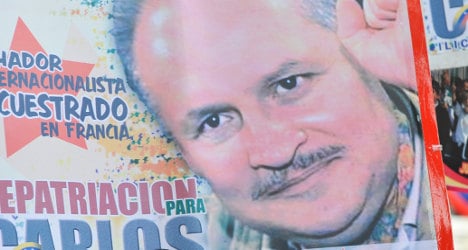A French court on Wednesday upheld a life sentence handed to Carlos the Jackal, once one of the world's most-wanted criminals, who had appealed against his conviction for a series of deadly bombings in France 30 years ago.
The eccentric 63-year-old Venezuelan, whose real name is Ilich Ramirez Sanchez, addressed the court for four hours at the end of the six-week trial on Wednesday, before a panel of judges went into chambers for deliberations.
Carlos, who has been imprisoned in France since 1994, was found guilty in 2011 of masterminding the 1982 and 1983 attacks on two French passenger trains, a train station in Marseille and a Libyan magazine office in Paris.
Already serving life for murder at the time, Carlos was given another life sentence for his role in attacks that left 11 people dead and nearly 150 injured, earning him the mantle of the world's most-wanted fugitive.
Carlos' lawyer Isabelle Coutant-Peyre said her client would appeal once again, criticising a verdict she said was decided "without a shred of proof by a discredited justice" system.
Carlos has denied any involvement in the attacks and said during the appeal that the evidence gathered from intelligence files against him was unreliable.
In his address to the court, Carlos said the evidence had been falsified by "manipulators serving foreign powers" and accused French investigators of being "agents of the American embassy".
"We are not terrorists, we are soldiers!" Carlos, dressed in jeans and a leather jacket, told the court.
Prosecutors had called for the life sentence to be upheld, saying Carlos remained "extremely dangerous".
The 1982-83 bombings were widely believed to have been carried out to avenge France's detention of two fellow members of a militant group Carlos ran with the support of East Germany's notorious secret police, the Stasi.
Prosecutors in France had struggled to secure a conviction until the release of secret Stasi files in the years that followed the collapse of Communism and German reunification.
The panel of judges also confirmed the acquittal of Christa Froehlich, a 70-year-old German, over charges of involvement in one of the attacks.
Froehlich was tried in absentia in 2011 and did not attend the appeal.
In numerous interviews over the years, Carlos has called himself a "professional revolutionary" and claimed responsibility for or involvement in dozens of attacks in which hundreds of people have died.
After years on the run from Western security services, he was finally arrested in Sudan in 1994 and transferred to France, where he was convicted three years later of the 1975 murder in Paris of two members of the French security services and an alleged informer.
He could yet face a third trial in France, as an examining magistrate is still investigating a 1974 bombing in the centre of Paris that left two people dead and 34 injured.
Venezuela's late leader Hugo Chavez was a strong supporter of Carlos, describing him as a revolutionary who had been wrongly convicted.



 Please whitelist us to continue reading.
Please whitelist us to continue reading.
Member comments